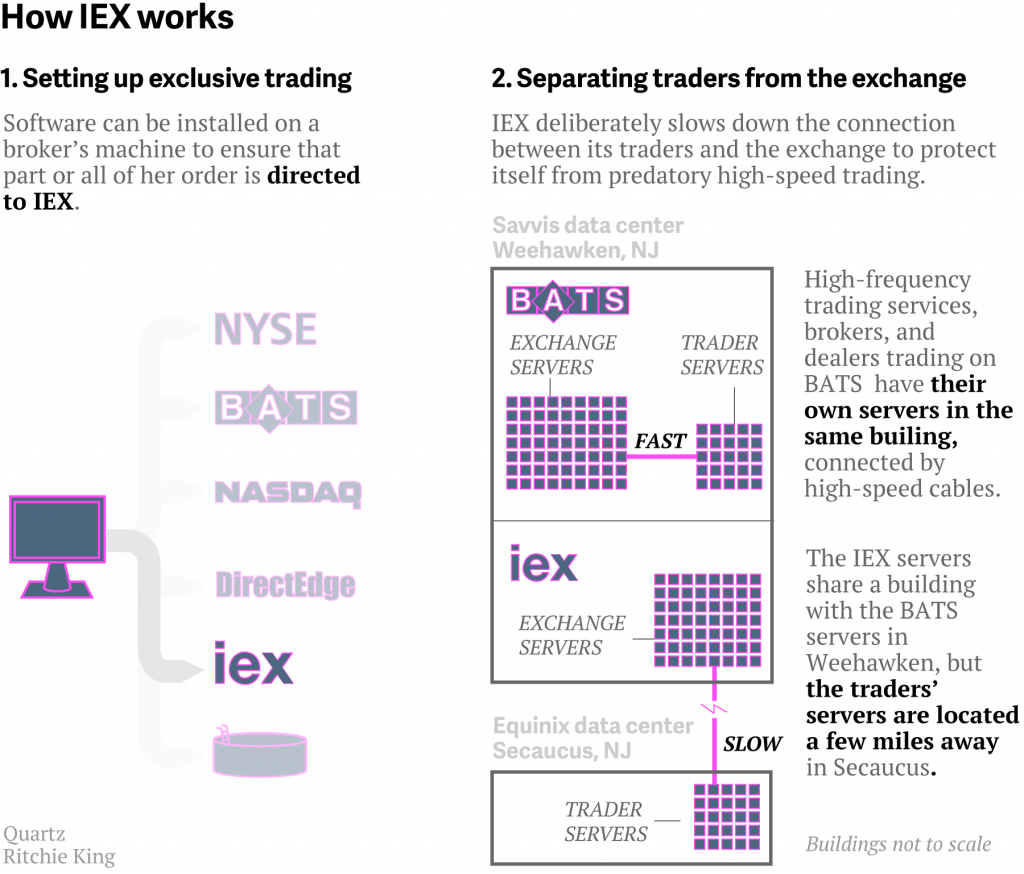Upstart trading company and dark pool operator IEX, best known for their CBS 60 Minutes interview and recently featured in Michael Lewis’s best-selling book Flash Boys, is in talks with investors about raising money to become a new exchange that will not be dominated by high speed, algorithmic traders.
IEX is talking to potential investors about building out their operational infrastructure and paying the legal fees associated with setting up a full-fledged exchange. While the discussions are ongoing, IEX could have a valuation of $200 million to $300 million which is considered high for a company that has only been around since October of 2013 and only makes up a small percentage of the overall volume of US stock trading.
Wearing Two Hats
Currently IEX is a dark pool operator. Dark pools buy and sell stocks that are matched and no information about the trade is published until “after” the trade is executed. IEX even has a comforting name for it: the “True Price Matching Engine.”
The thing is, things that are true already have an engine that creates them. It’s called reality and it lives right out in the open, not in a proprietary algorithm. Calling their price-matching (dare we say fixing?) algo “True Price” is like calling a law to allow more air pollution the Clear Skies Act.
Other, regulated stock exchanges are more transparent and publish trades in real time. Nevertheless, all of those exchanges have become dependent on some form of high-frequency trading (HFT). That’s where the money is. A few years ago HFT made up nearly 70% of the exchanges’ daily volume and still makes up over 50%.
The problem is that while IEX has made a name for itself talking about the unfair playing field it also allows HFT trading firms to use its platform. The key difference between IEX and unregulated dark pools—a difference Quartz’s Simone Foxman praised as a “remarkably elegant” solution—is that IEX has installed a “speed bump” of 350 millionths between the time the trader sends an order and when it hits the IEX computers.
This tiny delay, IEX says, will eliminate the HFTs’ ability to use speed to perform predatory front-running of trades. The question of course is, will it really do that? Or is it just a great marketing tactic?
David vs Goliath? Or a virus?
The big question is how can such a small company compete with the likes of the NYSE or Nasdaq ({{14958|^IXIC Nasdaq}})? According to Rosenblatt Securities, IEX’s daily volume reached 29 million shares in April, up 53% from March. This is one of the fastest starts for a dark pool on record but only makes up 0.5% of total daily volume.
Giant hedge fund Citadel LLC of Chicago says that IEX’s market is skewed in favor of brokers, to the detriment of “retail traders,” as IEX allows orders from their brokers to jump in front of private firms for their personal accounts.
Law enforcement agencies and regulators are finally paying some serious attention to high-frequency trading. The scrutiny is long overdue and people are finally seeing past the myth that HFT is just a benevolent addition of much-needed liquidity and calling it what it is: very fast front-running of investor orders by brokers and funds using rigged mechanisms.
In such an uncertain environment, it’s hard to believe that any firm including IEX could think that the public or any regulatory agency would sanction creating an exchange out of a firm that is front-running customer orders. Michael Lewis’s book may have made IEX a popular name but that says more about IEX’s marketing skills than any sincere effort to create a level playing field for investors.
IEX still does the same thing all the other HFTs do; they front-run customer orders. I don’t care if they came from RBC (NYSE:RY) or JC Penney(NYSE:JCP) they are crooks and until they give up their swindling ways they should not be allowed to apply for anything.
And if their application is accepted and they become a regulated exchange, it will raise new questions about the credibility of regulatory agencies and law enforcement—precisely what the economy does not need in the wake of the massive crisis in trust that came with the financial crisis.

